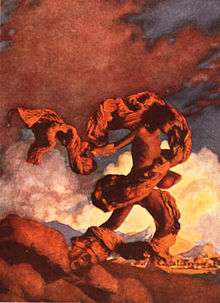The Thebans
The Thebans or The Theban Brothers (La Thébaïde ou les Frères ennemis) is a tragedy in five acts by Jean Racine. His first dramatic work, it was first staged, without great success, on 20 June 1664 at the Petit-Bourbon. It enacts the combat and death of two young, twin brothers, Eteocles and Polynices. The twins, along with their sister Antigone, were children borne of the incestuous marriage of the Theban king Oedipus and his mother Jocasta.
This ancient Theban drama attracted great interest among 17th century French writers. The young Racine drew principally upon sources from Sophocles and Euripides, as well as the Antigone of Rotrou, and the Oedipus of Pierre Corneille. Molière may also have assisted in the play's composition.
Analysis
Traditional scholarship saw limited merit in the play, deeming it an only partially successful work of a still maturing dramatist. In his groundbreaking work On Racine, however, Roland Barthes treats the play as seriously as Racine's greatest Greek dramas, including Phèdre and Iphigénie).[1] Since Barthes, recent scholarship has shown greater interest, exploring, for example, power relationships driving the action, and, more broadly, fundamental problems of political philosophy that arise with respect to the legitimacy of the modern state.[2]
References
- ↑ Roland Barthes, Sur Racine, Paris, FR: Seuil, 1963
- ↑ Eric Heinze, ‘“This power isn’t power if it’s shared’: Law and Violence in Jean Racine’s La Thébaïde’, 22(1) Law & Literature (2010)
| |||||||||||||||||||||
